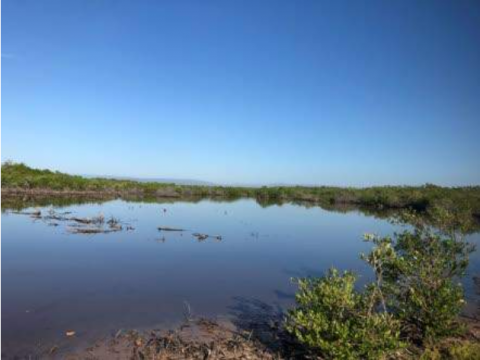
Millions donated to save Clarendon mangroves

THE Inter-American Development Bank (IDB) has signed a landmark agreement for mangrove restoration with The University of the West Indies (The UWI)-based Solutions for Developing Countries (SODECO).
The agreement — signed by Therese Turner-Jones, the IDB's country representative for Jamaica, and Professor Terrence Forrester, chief scientist at SODECO — will enhance Jamaica's ability to adapt and increase its resilience to climate change through a technical assistance programme on mangrove restoration.
Financing for the restoration project will come from a grant valued at US$2.45 million, which is J$360 million, provided by the “UK Blue Carbon Fund”, which was established in the IDB in 2019, and financed by the United Kingdom's Department for Environment, Food and Rural Affairs.
There is a growing recognition of the critical importance of mangrove forests in providing economic, ecological and social goods and services, including the provision of coastal protection, habitats for commercially important seafood, and the capture and storage of carbon dioxide.
A section of the mangrove in Clarendon set for restoration under an agreement being financed by the United Kingdom's Blue Carbon Fund.
The carbon that is captured and stored in these coastal and marine ecosystems is referred to as “blue carbon” and is an important element in reducing the impact of climate change.
As these vital ecosystems are restored, conserved and managed, their capacity to carry out this natural storage function improves.
The blue carbon restoration in southern Clarendon is designed to restore more than 1,000 hectares of degraded mangrove forest, and boost ecosystem-based livelihood opportunities.
The project is the first of its kind in a series of blue carbon projects in Latin America and the Caribbean to be implemented by the IDB under its UK Blue Carbon Fund, through its Natural Capital Lab and Sustainable Islands programmes.
The fund was designed to promote the sustainable management of mangrove forests and accelerate the blue economy and sustainable development in countries with important mangrove ecosystems in the Caribbean and Latin America.
“With the recovery to the COVID-19 pandemic and 2020 hurricane season set to overlap, we urgently need to provide quality green jobs while building resilience to the climate emergency. This project can be win-win at this remarkably difficult time,” said Turner-Jones.
“This project is the latest in a series of investments by the UK Government in the interest of Jamaica's blue economy. In recent memory alone, there's been the handing over of multi-beam sonar equipment and delivery of a three-week capacity-building programme in the area of seabed mapping,” said Asif Ahmad, British high commissioner to Jamaica.
“Last year, Jamaica received a visit from a special representative to the Commonwealth Clean Ocean Alliance stationed within the UK department for environment. These are all strategic and geared towards the development of a sustainable blue economy and overall economic growth.
“Mitigating the debilitating effects of climate change on our planet is still very much a primary focus area for the UK this year, and this massive restoration effort is very much aligned to those efforts,” added Ahmad.
The British high commissioner added: “With one eye on the upcoming Atlantic hurricane season and the next firmly set on the current global pandemic that is COVID-19, this project will not only firm up climate resilience but provide much-needed environmentally friendly, green jobs in this most difficult period.”
The project, which will be the largest mangrove restoration project undertaken in Jamaica, is expected to be completed by 2026. It is expected to result in a mangrove system that is viable, healthy and optimally functioning.
“Having this opportunity to restore these decimated mangroves in Jamaica, and with them the several recognised ecosystem services which they provide, is nothing short of an absolute privilege,” said SODECO'S head Forrester.
SODECO is a research organisation established by The UWI, which is mandated to provide opportunities to improve human health, wealth and well-being in developing countries. It manages grants from various international and local organisations.

